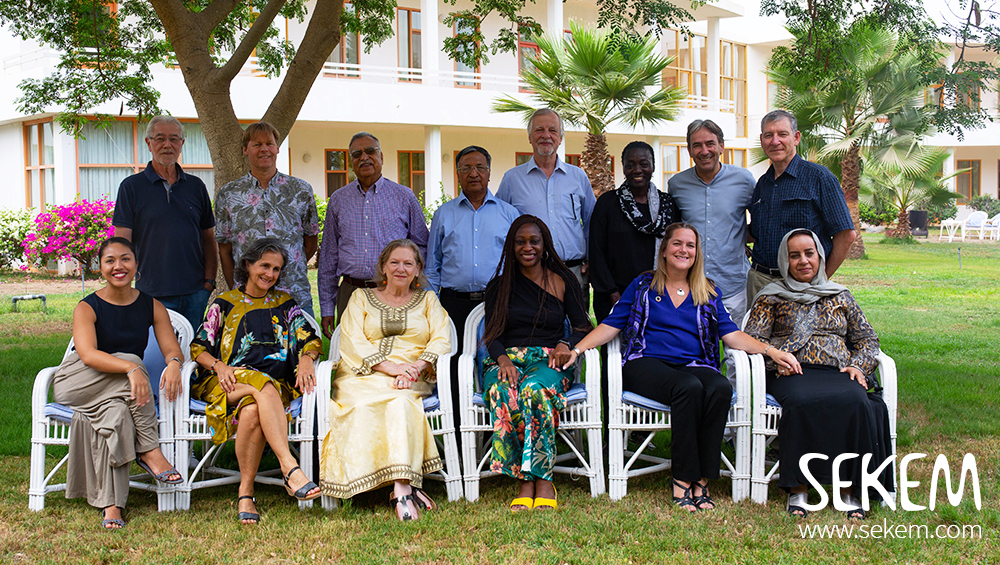World leaders identify solutions and call for immediate action
As the youth takes to the street and the Amazon continues to burn, Councillors of the World Future Council and Recipients of the Right Livelihood Award, who gathered at SEKEM during the past days, call for immediate action to secure a world of climate resilience, prosperity and peace at a World Future Forum.
Solutions exist
“Solutions exist. We can eradicate hunger and improve livelihoods by adopting 100 per cent agroecology,” says Helmy Abouleish, Councillor of the World Future Council who hosted the forum at SEKEM, Cairo. SEKEM is a recipient of the Right Livelihood Award and a global leader in the development of agroecology.
In their declaration, Councillors and Right Livelihood Award Recipients call for measures to cut carbon emissions in half by 2030 to avoid climate catastrophe and achieve 100 per cent renewable energy by 2050. The leaders call on governments to end spending USD 1.7 trillion annually on weapons and war. “With this budget, the health of our planet can be secured and the very foundations of life regenerated – forests, soils, oceans, and the atmosphere”, their declaration states.
“With the budget of USD 1.7 trillion that is spent on wars and weapons the health of our planet can be secured and the very foundations of life regenerated.”
At the forum, leaders also adopted the work programme of the World Future Council. The organisation works with policy makers, promoting the spread of best policies across the world. “We brought together change makers from around the world and all walks of life. They are urging decision-makers to take rapid action to address the earth emergency,” explains Alexandra Wandel, the foundation’s Executive Director.
Renewable Energies
In regards to decarbonizing the world’s energy systems, the World Future Council advocates policy makers on the implementation of climate policies based on scientific evidence and new technological opportunities and facilitates a policy-science interface. “Renewable energy is a pathway to prosperity. The technology has huge positive impacts on livelihoods; it creates decent jobs and reduces greenhouse gas emissions. Let’s bring light, income and health to people across the planet”, says Dipal Barua, Councillor of the World Future Council and Founder of Bright Green Energy Foundation Bangladesh.
To end war and build a secure and sustainable future, the leaders call on governments to adhere to their obligations as UN members to eliminate nuclear weapons and resolve international conflicts through diplomacy, mediation, arbitration and adjudication. “In this increasingly interconnected world, there is no longer any excuse to base our security on war or on threatening to annihilate the planet,” said Alyn Ware, Councillor of the World Future Council and Global Coordinator of Parliamentarians for Nuclear Non-proliferation and Disarmament.
Call for 100 per cent agroecology
The World Future Council is calling for a transition to 100 per cent agroecology and will expand its work of researching, identifying and championing best policies that up-scale agroecology and thereby address issues of biodiversity, water, agroforestry and landscape restoration, livelihoods, climate, health and animal welfare. “We need to change our direction. We have the answers; we simply need to act,” says Jan McAlpine, Councillor of the World Future Council and former Director General of the United Nations Forum on Forests.
Delegates call for effective institutions to safeguard the rights of present and future generations at all levels of government decision making. The council advocates for education for sustainable development and calls for it to be widely implemented. “We applaud the children and youth of today for their creativity, courage, and commitment in demanding action to address the challenges we are facing in securing their future,” says Auma Obama, Councillor of the World Future Council and Founder of the Sauti Kuu Foundation.
Oceans are under vast pressure from overfishing, pollution and acidification. While recognizing that a wide range of transformative measures is needed, the newly founded commission on oceans and waterways will advocate for the protection of at least 30 percent of the oceans by 2030. “Every person depends on the ocean to live – for seafood, jobs, well-being, and oxygen. We need to take care of our oceans the way they have taken care of us,” says Anna Oposa, Councillor of the World Future Council and Chief Mermaid of Save Philippine Seas.
SEKEM received the Right Livelihood Award in 2003 and SEKEM CEO Helmy Abouleish became a member of the World Future Council in 2017 after his father passed away.
Read the full declaration here!
Source: World Future Council

